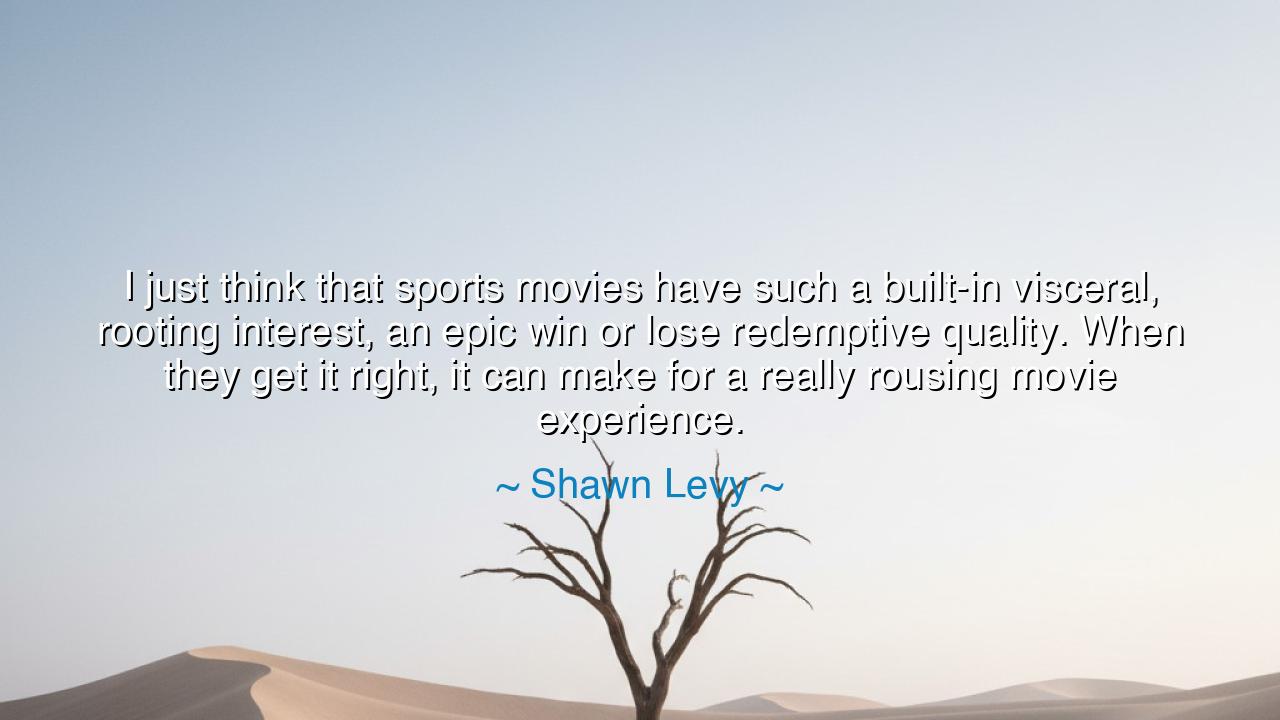
I just think that sports movies have such a built-in visceral
I just think that sports movies have such a built-in visceral, rooting interest, an epic win or lose redemptive quality. When they get it right, it can make for a really rousing movie experience.






"I just think that sports movies have such a built-in visceral, rooting interest, an epic win or lose redemptive quality. When they get it right, it can make for a really rousing movie experience." These words from Shawn Levy tap into a fundamental truth about storytelling that has transcended time and culture: the powerful allure of the victory and struggle of the human spirit. Sports movies, in their essence, are more than just about athletic performance—they embody the very spirit of humanity: the desire to rise above adversity, to strive for something greater, and to find redemption through effort and courage. They are tales that mirror the greatest dramas of life, the epic struggles of heroes who fight against the odds to achieve something meaningful.
In the ancient world, such stories were woven into the very fabric of the culture. The Greek tragedies and epic poetry often told of warriors and kings who faced monumental challenges, not just on the battlefield but in their own hearts. Consider the hero Achilles in Homer’s Iliad—his struggle was not just against the Trojans but against his own rage, pride, and inner turmoil. His redemption came not in a single battle, but in the acceptance of his fate and the decision to rise above his flaws for a greater purpose. Much like the heroes of sports films, Achilles’ journey is about self-discovery, growth, and the redemptive power of overcoming personal demons to find peace or victory.
The concept of victory and redemption is not unique to sports films alone; it has been a staple of human storytelling since time immemorial. Consider the Roman gladiators—their lives were not simply about physical combat, but about the hope of freedom, the chance for redemption in the eyes of the crowds, and the belief that through their struggles, they might earn something more than just survival. Their victories, as brutal as they were, represented the epic win of one who, through sheer force of will, overcame impossible odds. In the same way, sports films mirror this struggle—athletes, like gladiators, are placed in environments where they are tested in body and spirit, and their ultimate redemption comes not just through winning, but in overcoming themselves.
One of the greatest examples of this narrative in modern times is the story of Rocky Balboa, the underdog boxer created by Sylvester Stallone. Rocky is not just about physical prowess in the ring; it is about a man who is broken in body and spirit, struggling with a life of poverty and disillusionment, but who fights not for fame, but for his own dignity and self-worth. The movie Rocky taps into something universal—the struggle of humanity to rise above life’s circumstances, to prove oneself in the face of overwhelming odds. The visceral rooting interest that Levy speaks of is embodied in Rocky’s journey—each punch he throws is a metaphor for our own battles in life, whether it’s to rise above failure, overcome hardship, or find redemption in our lives.
This desire for redemption through struggle is not only found in sports films but throughout history, in the lives of people who overcame adversity to achieve greatness. Nelson Mandela, for example, spent 27 years in prison, enduring immense suffering and hardship, yet upon his release, he sought reconciliation and redemption, not vengeance. His victory was not just in the release from prison but in the moral victory he achieved by rising above the pain and divisions of his past, creating a new future for South Africa. Mandela’s life mirrors the sports narrative of redemption: the story of a person or people who, through sheer determination, courage, and resolve, achieve something far beyond mere victory—they achieve transformation.
The power of sports films, then, lies not just in their portrayal of the game or the contest, but in their ability to reflect the universal human experience—the struggle, the sacrifice, the pain of striving toward something greater. Just as the ancient epics celebrated the trials of heroes who faced both internal and external battles, so too do sports films capture this heroic journey. They are not simply about the final score or the trophy; they are about the journey, the growth, and the moments of surrender and triumph along the way. Levy’s words remind us that when a film gets this dynamic right, it connects deeply with us, stirring emotions we may not even realize we carry.
The lesson to be drawn from this is clear: to truly live, we must embrace the struggles and triumphs that come with our human condition. We must, like the heroes of sports films and ancient tales, learn to fight for what is meaningful, to find redemption not just in the external victories, but in the growth and transformation that occur within. Life, much like a sports movie, is filled with moments of defeat and victory, but the true measure of success lies in our ability to rise from our challenges, to learn from our losses, and to continue the fight for something greater than ourselves.
In practical terms, we must remember that greatness does not come from avoiding struggle but from embracing it. Whatever challenges you face—whether in your personal life, career, or relationships—understand that these are the arenas in which your true character will be forged. Like the athletes, the gladiators, and the heroes of ancient epics, rise above your circumstances, not for the applause, but for your redemption, your growth, and your ultimate victory in the journey of life. Let the lessons of these films, these stories, guide you to a life of purpose, endurance, and inner triumph.






AAdministratorAdministrator
Welcome, honored guests. Please leave a comment, we will respond soon